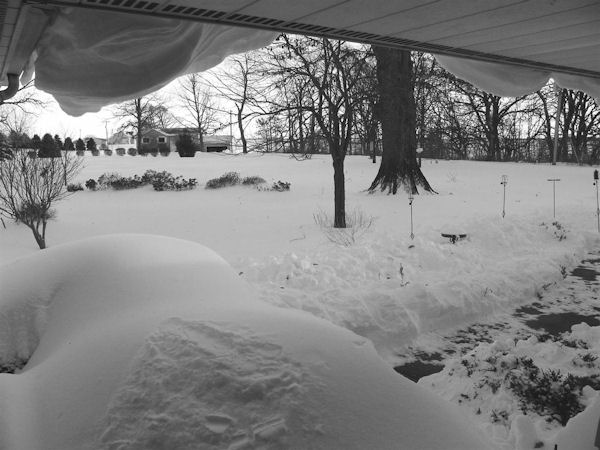 Blizzard Keeps Us Home
Blizzard Keeps Us HomeThe Hancock-Henderson Quill, Inc.
 Blizzard Keeps Us Home
Blizzard Keeps Us Homeby Dessa Rodeffer, Quill Publisher/Owner
February 2, 2010
The predictions were for snow, 13-20 inches and high winds for blizzard like conditions in Midwestern Illinois - and they were right. I had a nice surprise at my front door.
My good friend, who always does her "snow dance" had overdone it this time.
Henderson and Hancock counties saw strong winds Tuesday nigh-Wednesday morning gusting over 50 mph which kept schools and businesses closed, even factories were closing early or all together. It also had me stranded at The Quill all night, and besides my efforts, the blocked roads and high winds kept me from traveling to Astoria 64 miles away, and printing our paper Wednesday at Stevens Publishing.
My husband tried three times to get from our home in Stronghurst to one of our farms off the Fountain green blacktop in Hancock County and found a snowplow stuck on State Hwy 94 around "Fishers' curve" the second time he tried. Eventually he got a ride as far as the railroad tracks on the Fountain Green road and was forced to walk the 1/2 mile to our farm. People were getting stuck when they drove a vehicle without 4-wheel drive due to the drifting of snow in spots that were double that of other places.
Governor Quinn called out more than 500 national Guard to assist State Police and stranded motorists across the state.
Illinois State Police were urging motorists to stay off roads Wednesday as roadways are snow covered with very little visibility due to blowing and drifting snow making driving "treacherous and extremely dangerous."
"Even if motorists are able to get their vehicles out of their driveways, they will not be able to get very far," said Trooper Ed Howard District 14 safety officer.

Troopers were responding to calls in snowplows and national Guard Humvees to assist stranded motorists and urged people to stay home as to not interfere with snow removal and prolong efforts to open roads.
A posting of roads closed included most all interstate and Lake Shore Drive in Chicago is closed due to high winds and ice and many cars were stranded. One relative in Chicago said she was walking her dog visiting with lots of other folks in downtown Chicago down the middle of the street as most streets had been closed.
Ameren Illinois warned of snow, ice, power outages and natural gas problems asking to use a broom to keep natural gas meters and piping clear, warning never to use a shove, icechipperr or tool that could damage equipment and create a potentially dangerous situation or disrup service.
Chimney and flues and vents for all natural gas appliances should be kept clear of snow and ice as blockage can cause deadly carbon monoxide buildup inside your home in a matter of hours, Ameren warns.
If you suspect a leak or problem call 1-800-755-5000 but away from the home, not inside. They also warn in case of a power outage, do not use a natural gas stove burners or the oven to heat your home.
Your stove is designed for cooking and baking and running it with an open door can lead to a dangerous buildup of carbon monoxide. In addition the oven may overheat and cause a fire. They also remind that every home and apartment in Illinois is required to have at least one carbon monoxide detector within 15 feet of every bedroom.
Portable generators also must never be operated inside a garage or other building as the engines produce deadly carbon monoxide.
The American Red Cross out of Macomb reported that their organization is on the ground in 19 states offering food, comfort and a safe place to stay to people affected by the massive storm which ahs buried the country in ice and snow from the Rocky Mountains to Maine. by Tuesday night, 73 shelters were open in nine states. They also reported that blood donors are needed due to nearly 23,000 uncollected and as the storm moves toward new England, they expect it to rise. You may schedule to give by calling 1-800-RED-CROSS. You may also call that number for other things such as finding a shelter. They warn if shoveling snow, take frequent breaks and stay hydrated and avoid overexertion. Carry a disaster supply kit in your truck if you must be out. keep the gas tank full. Know the route you are taking before you leave and your expected arrival time.